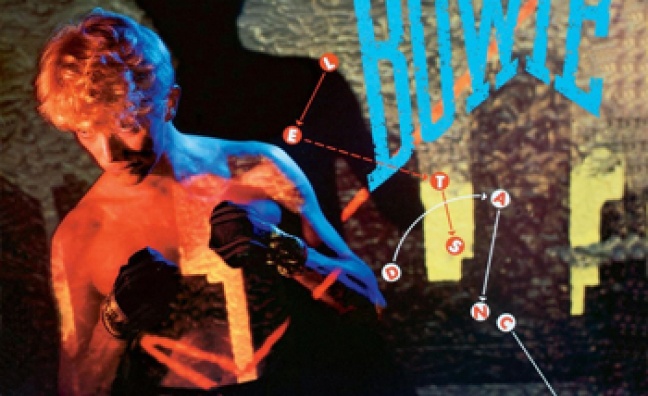Drafting provisional observations for this week's chart analysis on Sunday, I had already made note that David Bowie would become the third oldest artist to have a No.1 album with new material in chart history, trailing only Bob Dylan and David Gilmour. Sales flashes for his 25th studio album Blackstar, which dropped on Friday - his 69th birthday - showed that it was outselling the next three albums combined. Nothing could deny him that honour, I thought, unless a very famous chart rival died suddenly.
Well something did go wrong, but it isn't the death of a rival that will deny Bowie the opportunity of becoming the third oldest chart-topper, it is his own. Blackstar was to have been his 10th No.1 album as a living artist but will instead become his first posthumous No.1.
Elsewhere in Music Week, his music and life will be put into context but here we'll take a look at the statistics of his chart life.
Born David Robert Jones in Brixton on 8 January 1947 - Elvis Presley's 12th birthday, and Shirley Bassey's 10th - Bowie was just 17 when, in 1964, he released his first single, Liza Jane, which was credited to Davie Jones with The King Bees. Neither it nor eight subsequent singles released over the next three years managed to chart, but he re-emerged in 1969, and scored a No.5 hit with Space Oddity, his haunting homage to the fictional Major Tom.
Seemingly losing his way again, he didn't return to the chart until 1972, adopting a brand new image and style for the first of many times, and reaching No.10 with Starman. Thereafter, it was pretty much plain sailing, with at least one new chart entry every year until he took a break in 1987. As both a singles and albums artist he has become one of the most prolific, both in terms of quantity and quality of output, in chart history.
Between his chart debut in 1969 and his last hit in 2013 - when his 66th birthday single Where Are We Now? debuted and peaked at No.6 to become his highest charting single in 27 years - Bowie amassed 68 Top 75 singles, reaching No.1 five times, and making the Top 10 25 times. He charted a further four singles fronting Tin Machine, though none of these made the Top 10.
As an album artist - before the release of Blackstar - Bowie topped the chart nine times, with Aladdin Sane (1973), Pin Ups (1973), Diamond Dogs (1974), Scary Monsters (And Super Creeps) (1980), Let's Dance (1983), Tonight (1984), Changesbowie (1990), Black Tie White Noise (1993) and The Next Day (2013). He made the Top 10 with 29 albums and the Top 75 with 59 albums solo. He was also frontman to the short-lived rock group Tin Machine, who reached No.3 with their eponymous 1989 album, and No.23 with Tin Machine II, two years later.
Distribution and marketing of Bowie's recordings have changed hands many times over the years, and calculating accurate sales figures for his albums is almost impossible, certainly within a few hours of his death, although the biggest seller is undoubtedly the 2002 compilation Best Of Bowie, which has sold 1,128,341 copies thus far.
We're on safer ground with his singles. With previous actuals and estimates updated to close of business last Thursday, the Top 12 are as follows:
|
Title |
Date of First |
Sales |
|
|
Chart Entry |
|
|
Let's Dance |
Mar 83 |
905,029 |
|
Under Pressure* |
Nov 81 |
764,140 |
|
Dancing In The Street** |
Sep 85 |
725,155 |
|
Space Oddity |
Sep 69 |
680,825 |
|
Ashes To Ashes |
Aug 80 |
679,703 |
|
Modern Love |
Sep 83 |
522,989 |
|
China Girl |
Jun 83 |
504,424 |
|
Life On Mars |
Jun 73 |
482,453 |
|
Peace On Earth - Little Drummer Boy*** |
Nov 82 |
445,424 |
|
Sound And Vision |
Feb 77 |
355,513 |
|
The Jean Genie |
Dec 72 |
336,653 |
|
Absolute Beginners |
Mar 86 |
309,241 |
* = Queen & David Bowie, ** = David Bowie & Mick Jagger, *** = David Bowie & Bing Crosby.
Bowie has sold upwards of 12,090,000 singles in Britain, and that total looks set to increase considerably over the next few weeks - by 4pm today, 55 of the Top 200 singles on iTunes were by Bowie, as were the Top 5 albums. The first track to breach the iTunes Top 10 today, Heroes, was a fairly minor No.24 hit in 1977, selling only 55,000 copies at the time, although it has grown in popularity enormously over the years and ranks behind only Life On Mars and Queen collaboration Under Pressure in digital sales, which were nearing 170,000 copies before his death.
Bowie's catalogue is booming globally too, with Space Oddity his best performing track globally, entering the Top 40 in more than 30 countries by 4pm UK time today.
A complete UK Bowie chartography can be found at the OCC website.








